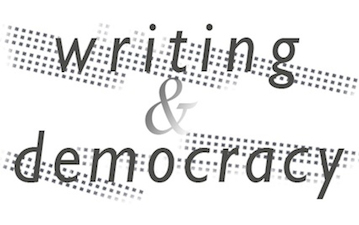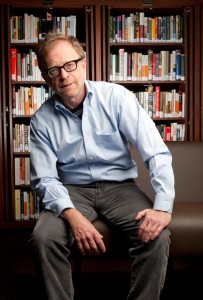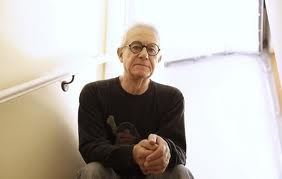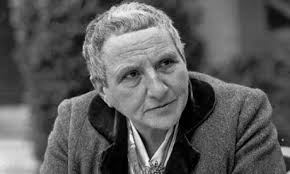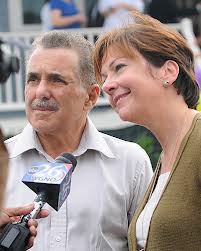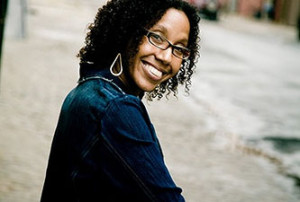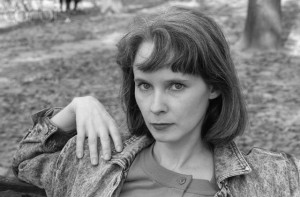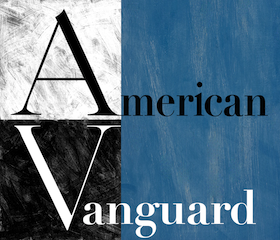The Riggio Honors Program: Writing & Democracy
Mission
The Len and Louise Riggio Writing & Democracy Program at the New School focuses an ambitious initiative to reinvent undergraduate education through a sustained investigation of language and democratic expression across a spectrum of cultural, political, social, and artistic experiences, with a special emphasis on intensive sequences of close reading and supervised writing.
The Program is rooted in a supposition that we live inside a culture that assumes as citizens we don’t pay close attention to much of anything, assumes—in fact—we don’t know how.
Students in Writing & Democracy explore a singular diversity of “common” American languages—the Constitution, 19th and 20th century songs, politics, history, speeches, film, photography, criticism, painting, fiction, poetry, and memoir—and discover how to write about—as well as how to write from inside—these rhetorics, disciplines, and arts.
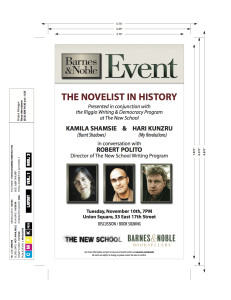 The Writing & Democracy Program is a progressive undergraduate program of writing workshops and close reading seminars that operates along the seams of Orwell’s “special connection” between writing and democracy. In his prescient essay of almost 70 years ago, “Politics and the English Language” (1946), George Orwell famously tracked the “special connection” between a “decadent” politics and the “debasement of language.” The “slovenliness of our language makes it easier for us to have foolish thoughts,” Orwell argued. “In our time, political speech and writing are largely the defense of the indefensible . . . Thus political language has to consist largely of euphemism, question-begging and sheer cloudy vagueness.” The “fight against bad English is not frivolous,” Orwell concluded, “and is not the exclusive concern of professional writers.”
The Writing & Democracy Program is a progressive undergraduate program of writing workshops and close reading seminars that operates along the seams of Orwell’s “special connection” between writing and democracy. In his prescient essay of almost 70 years ago, “Politics and the English Language” (1946), George Orwell famously tracked the “special connection” between a “decadent” politics and the “debasement of language.” The “slovenliness of our language makes it easier for us to have foolish thoughts,” Orwell argued. “In our time, political speech and writing are largely the defense of the indefensible . . . Thus political language has to consist largely of euphemism, question-begging and sheer cloudy vagueness.” The “fight against bad English is not frivolous,” Orwell concluded, “and is not the exclusive concern of professional writers.”
A close attention to language—a vigilance and sophistication in the use and appreciation of words—is both vital preparation for a career as a writer, whether poet, novelist, or nonfiction writer, and an essential prerequisite for alert, informed citizenship, particularly in a world heaped by 24-hour cable news networks, government information and disinformation, the Internet, and our other turn-of-the-twenty-first-century analogues to Orwell’s culture of “euphemism,” “question-begging,” and “vagueness.”
This New School undergraduate writing initiative seeks to merge study and practice, the aesthetic and the political. The Writing & Democracy Program builds upon the mission and achievements of The New School Graduate Program in Creative Writing and continues the vital historical New School legacy of the artist as public intellectual.
The Writing & Democracy Program is grounded in the art and craft of writing, and the study of literature. But there is a special emphasis on the writer engaged in and grappling with the world, and a recognition that literature in our time also includes other imaginative and performative uses of language, including speeches, historical documents, news, advertisements, science, rhetoric, and persuasion. There is an intuition that nonfiction—especially memoir, biography, essay, and history—is likely the signature genre of our era.
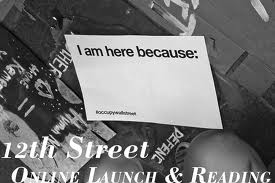 The Internet is axial to the Writing & Democracy Program, for both everyday practice and overall design. Passionate students seriously and stylishly blog (on the website of 12th Street, the Riggio Program’s literary journal)—about topics veering from their reading inside and outside class to legislation and elections. As for the signature role of intensive close reading and writing for tracking our latest technologies, we note that as a result of the omnipresence of the Internet the ordinary experience of the ordinary global citizen more and more resembles life inside a Modernist novel or poem—from Melville and Dickinson to Joyce, Stein, Eliot, Beckett, and Pound. The once radical innovations of Modernist literature—unreliable narrators, multiple voices, fragmentation, collage, ricocheting allusions, and instabilities of language and identity—now are the routine givens of our daily online life, whether at home or the office, our public or private selves.
The Internet is axial to the Writing & Democracy Program, for both everyday practice and overall design. Passionate students seriously and stylishly blog (on the website of 12th Street, the Riggio Program’s literary journal)—about topics veering from their reading inside and outside class to legislation and elections. As for the signature role of intensive close reading and writing for tracking our latest technologies, we note that as a result of the omnipresence of the Internet the ordinary experience of the ordinary global citizen more and more resembles life inside a Modernist novel or poem—from Melville and Dickinson to Joyce, Stein, Eliot, Beckett, and Pound. The once radical innovations of Modernist literature—unreliable narrators, multiple voices, fragmentation, collage, ricocheting allusions, and instabilities of language and identity—now are the routine givens of our daily online life, whether at home or the office, our public or private selves.
The core of the program consists of a 24-credit sequence of writing workshops and close reading seminars, and culminates in an undergraduate thesis project. Students also receive credit for participating in a “Writers Life Colloquium” of public readings, lectures, and symposia. The Writing & Democracy Program also sponsors large University Lecture Courses, such as those currently taught by Greil Marcus and Sam Tanenhaus, and there is, as already noted, a lively literary magazine, 12th Street, as well as public forums each fall and spring at the Union Square Barnes and Noble Store. The Program enrolls students across five academic divisions of The New School, Parsons, Lang, NSSR, Jazz, and the School of Writing. Writing & Democracy benefits graduate students as well as undergraduates, training and supervising TA’s who earn crucial fellowship income as they lodge valuable teaching experience.
Close reading, or “reading in slow motion,” is an act of resistance to this information age that turns out to be the best preparation for living in it. Moving word by word, sentence by sentence, close reading defines words in context, and proceeds along a series of incessant questions: What is this word (line, sentence, paragraph, poem, or story) saying, and more importantly how does it say it? What is it like to read this?
Close reading observes the flexibility of language, registering implications and resonances, focusing comparisons and connections, and tracking steadily larger patterns and designs. Attentive to the nuances of the real medium of literature—language—the close reading of poems and stories opens out into history and furnishes a ready template for the close reading of other social and political verbal performances, such as speeches, news reports, advertisements, and blogs and can in turn be extended to other media: images, photographs, and films also can be appreciated or scrutinized through the skills of close reading.
Students learn to read as writers by asking questions through an inspection of self and text. To discover how language operates in such literary and historical writings is also to discover how language operates in the world. Close reading assumes that what’s essential about a literary or historical text isn’t the exclusive property of an expert, such as a classroom teacher, but is available to a student once he or she is able to ask questions of the work. Riggio students read as writers through a close attention to language across a diversity of texts, ranging from poems, stories, and plays to speeches, documents, memoirs, and history. Close reading is an especially empowering technique for young students: Who is speaking? To whom? What is the speaker trying to accomplish? How does the speaker accomplish this?
The Riggio Writing & Democracy Program shapes a contemporary defense of literature, particularly the skills of close reading, though not from the familiar vantages of either the political right (a convenient tradition and standards) or political left (a tidy inventory of humanitarian values). Combining the aesthetic, the social, and the political, our Program argues the counterintuitive proposition that a close attention to complex language—specifically the intense word by word, sentence by sentence literary activity that once was the staple of English departments, but now is practiced mainly in American creative writing programs—offers the strongest possible training for everyday twenty‑first century life, a world overwhelmed by the fantastic variety of voices across the internet, government and corporate disinformation, and unprecedented 24/7 media. The Writing & Democracy Program suggests that the critical skills advanced by the close reading of literature—and notably “difficult” literature — are precisely the skills now required for informed, aware citizenship and a full engagement in the new technologies.
Modern writers have often spoken of their writing as a sort of model for democracy—think of Whitman announcing “I contain multitudes.” The composition of a self in a Modernist literary work through (and against) the medley of voices competing for attention and representation offers provocative analogues for contemporary politics. For someone lost inside the complexity of our various inventions and technologies, there are the media‑saturated fictions of Joyce’s Ulysses, the celebrity dramatizations of Stein’s Everybody’s Autobiography, and the collages of Eliot and Pound poems.
History
The Riggio Honors Program: Writing & Democracy originates in a series of conversations that took place at the Barnes and Noble headquarters on lower Fifth Avenue during the spring of 2005. Bob Kerrey, then President of the New School, made the introduction to Len Riggio, and initially I was joined by Arjun Appadurai (then The New School Provost) and Jonathan Veitch (then the Dean of Lang College) for a far-ranging discussion of possible collaborations around the notion of “democratic expression.” Pretty quickly Len signaled that he wanted to concentrate his attentions on “young writers,” and I started to meet alone with him and his close team—from the outset, the perspicacious and invaluable Mary Ellen Keating, the Senior Vice President of Corporate Communications and Public Affairs; and soon after, Louise Riggio, who spurred and grounded our meetings with a shrewd heedfulness to the needs of student writers.
This was a sophisticated seminar in the provocations of contemporary American education. Len immediately was intrigued by a program that would specifically emphasize language and combine the training of writers and the education of mindful citizens. But anyone who knows Len and Louise’s work in New Orleans after Hurricane Katrina, at DIA Beacon, and for Poets and Writers, will recognize that as a philanthropist as well as a businessman Len Riggio is a visionary, and many of the best ideas were inevitably his. He insisted, for instance, that we offer a course in the U.S. Constitution that would not only examine the major transformations in constitutional thought and design but also require the class to draft a new document to meet the demands of the 21st century. He believed that the Program “should encourage people who are not skilled writers, but interested in careers in politics and government as well”—hence the University Lecture Courses, open to students across the University, not just to writing students. He wanted to us to take advantage of The New School Writing Program’s reputation as a community resource, so we initiated the Riggio forums of lectures, panels, and other public events.
Finally, over a weekend in my study in New Paltz, NY, I condensed our conversations into a short proposal that for a “Writing & Democracy Program” that Len committed to fund for a four-year period. Throughout, Len and Louise proved attentive stewards—arranging for spectacular “launch” events at the Union Square Barnes and Noble for 12th Street; inviting the students to the office for good food and serious talk, and (as I remember vividly) a spirited look at one of their beautiful Alighiero Boetti pieces; and visiting the classes.
In 2009, Len and Louise Riggio renewed their gift, agreeing to sustain the Writing & Democracy Program through academic year 2014-15. As Len wrote then to Bob Kerrey:
Louise and I are pleased to make a pledge in renewed funding . . . The objective of our renewed support is to sustain the defining features of the current program, which include an innovative sequence of undergraduate writing workshops, close reading literature seminars, and university lecture courses; undergraduate fellowships and graduate student teaching assistantships, distinguished public readings and forums, and an undergraduate literary journal . . . We look forward to seeing this program continue to educate undergraduate students based on the pedagogical links between democratic expression and citizenship and the skills of reading, writing, and rhetoric.
Legacy, Resonance, Documentation, Assessment
The website you are about to enter is equal parts a Writing & Democracy internal review and a Program documentary project. Across diverse media and styles, you will be able to read, hear, or view reflective statements by many who have participated in the Program as students, TA’s, faculty, and administrators, and encounter some of the work we have produced.
Over just seven years, Writing & Democracy has already achieved some 1161 enrollments across four academic divisions of the New School, benefiting a distinctive range of undergraduates who have committed themselves either as full partakers of the complete cycle of seminars, workshops, and University Lecture Courses or as welcome participants in one or more of the component parts.
Writing & Democracy to date has brought together:
- 430 students from Parsons;
- 305 students from Lang;
- and 69 students from Jazz;
along with their many counterparts in the School of Writing and the School of Undergraduate Studies.
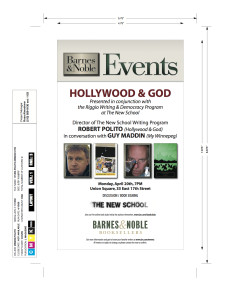 Writing & Democracy assists New School graduate students as well as undergraduates—over the past three-and-a-half years 57 graduate students have trained as TA’s, and this past fall Greil Marcus taught a seminar that mixed graduates students from the MFA in Creative Writing and the MA in Liberal Studies (NSSR))
Writing & Democracy assists New School graduate students as well as undergraduates—over the past three-and-a-half years 57 graduate students have trained as TA’s, and this past fall Greil Marcus taught a seminar that mixed graduates students from the MFA in Creative Writing and the MA in Liberal Studies (NSSR))
The strong interest across Parsons, Lang, Jazz, and NSSR speaks to the scope of Writing & Democracy, as well as to our institutional depth and vitality.
When a young student graduates from the Len and Louise Riggio Writing & Democracy Program, she or he will have been taught by world-class thinkers, artist, and writers—cultural historians, legal scholars, critics, journalists, memoirists, poets, and novelists—many of whom, luminaries along the lines of Jeffery Renard Allen, Catherine Barnett, Christopher Beha, Mark Bibbins, Patricia Carlin, Irwin Chen, Elizabeth Gaffney, Tim Griffin, Sam Haselby, Tom Healy, Zia Jaffrey, Luis Jaramillo, Deborah Landau, Suzannah Lessard, Greil Marcus, Sigrid Nunez, Robert Polito, Francine Prose, John Reed, Honor Sachs, Helen Schulman, Renè Steinke, Sam Tanenhaus, Linda Tvrdy, and Tiphanie Yanique—New School undergraduates already know and admire.
She or he will have heard provocative lectures on the Constitution by iconic figures from American political and academic life—a Greenwich Village democracy think tank with Cass Sunstein, Eric Foner, Elaine Scarry, and Bryan Stevenson.
She or he will have experienced galvanizing lectures, panels, and readings by an astonishing cavalcade of gifted, acclaimed, and engaged modern originals—Bill Moyers, Thomas Frank, Hamilton Fish, Walter Isaacson, Anne Deveare Smith, Michael Massing, David Thomson, Michael Lesy, Carrie Brownstein, Sasha Frere-Jones, Hilton Als, and Guy Maddin, George Packer, Anne Waldman, Robert Pinsky, Kevin Young, John Ashbery, Mary Gaitskill, Siddhartha Deb, Ann Powers, Stanley Crouch, Kiran Desai, and Wayne Koestenbaum.
She or he will have published writing in an award-winning magazine, 12th Street, meanwhile also negotiating—and mastering—the challenges of publishing a literary journal, under the experienced tutelage of the former editor-in-chief of The Literary Review.
And she or he will have studied literature and writing in scintillating seminars and workshops with a distinguished professional faculty of an eminence and skill customarily only approached by the strongest American Graduate Programs
Thus anchored in the notion that reading and writing are the engines of democratic literacy, Writing & Democracy prepares New School undergraduates for every sort of worldly career, including journalism, law, and the arts, but particularly for careers involving government, politics, and public life in America.
Of our recent graduating classes—students who completed the full program, including writing a thesis—we are pleased to note that many are already actively pursuing graduate degrees or careers areas that involve politics and public life. Others have gone on to prestigious Graduate Writing Programs.
Let me finish this history with a sampling of the accomplishments of a few representative current and recent Writing & Democracy students.
Starting with the Editors of 12th Street:
- Mario Zambrano, Issue 4 Editor, received the Iowa Arts Fellowship from the Iowa Writers’ Workshop. His novel Lotería was released by HarperCollins in Fall 2013, and was on the Booklist Top 10 First Novels of 2013.
- John Emrys Eller, issue 6 editor, works for the NGO International Peace Institute as assistant web editor.
- Lila Selim, issue 5 editor, is completing her MA in Literary Journalism at at NYU with a scholarship.
- Zoë Miller, the Issue 3 Editor, received the Edelstein Keller fellowship from the Creative Writing Graduate Program at the University of Minnesota.
- Issue 2 Editor Anna Utevsky completed the Farleigh-Dickenson MFA Program.
Continuing with some current Riggio Students:
- Riggio Student Ari Spool ran a campaign for Mayor of New York during fall 2013 and was spotlighted in the Wall Street Journal.
- Riggio student Aspen Matis sold her memoir Knapsacked to Harper Collins for publication.
- Ricky Tucker published an interview in December 2013 in “The Paris Review.”
- Nico Rosario has been accepted into the graduate program at Kings College in the UK to pursue an academic project in cultural studies.
- Timothy Jones has started his own small press, André Maurice Press LLC.
And concluding with a short roster of selected Riggio Alumni:
- Nick Broad is at work on The Busking Project, a documentary project in London.
- Gregory Collins completed the graduate program in Media Studies and founded the interactive literary journal Drift Index.
- Kate Cox is completing a Journalism degree at Columbia University.
- Marisa Frasca graduated from the Drew University Low-Residency MFA program.
- Yolande Goodman graduated from The New School MFA program.
- Leah Ianonne graduated from The New School MFA program.
- Theordore Kerr is the programs manager for Visual Aids and the 2010/11 artist in residence at the Institute of Art, Religion, & Social Justice at Union Theological Seminary.
- Ryoju Jack Lynch graduated from the MFA program at Hunter College, and is now also a Buddhist Monk.
- Rebecca Melnyk (former 12th Street Poetry Editor) was accepted with a full scholarship to Journalism school at Ryerson in Toronto.
- Debbie Rice founded the Blue Ridge Writers Retreat, which is held every July in Lake Summit, North Carolina.
- Tim Ryan graduated from the New School’s MFA program.
- Buku Sarkar graduated from the University of East Anglia MFA program and founded the nonprofit ReLit.
- Luke Sirinides is a student at the University of New Orleans MFA program.
- Leigh Stein published the novel The Fallback Plan in the fall of 2011 with Melville House as well as a book of poems from the same press, Dispatch from the Future.
- Jeff Vasishta is on scholarship at the MFA Program at Farleigh Dickenson.
- Sabrina Veroczi received an MA in International Affairs at The New School.
—Robert Polito
Read Robert Polito’s “Bob Dylan’s Memory Palace.”
